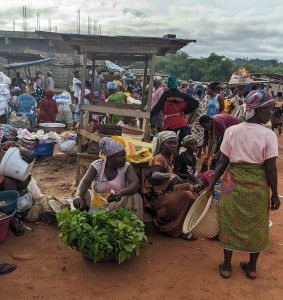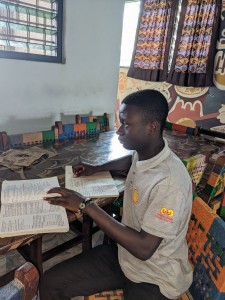Christine Myers, a longtime friend of Anansi, recently visited Ghana and helped tutor in the Host & Teach workshops held for Anansi students. She wrote and shared the following essay about her experience. Thank you, Christine, for your energy, time, enthusiasm and generosity for Anansi Education and all our students.
Ghanaian women in head ties and long cotton skirts weave through the crowded trotro station selling supplies for the journey. On their heads they balance round trays of their wares: kenkey, fermented white corn paste that’s wrapped in leaves and swallowed whole; mountains of salt-encrusted boiled eggs with tiny dabs of hot sauce on the side; cellophane plantain chip packets; loaves of bread; and plastic water sachets. Most of us shake our heads or use the Fanti word for no, dabi.
I’ve come to Ghana at the invitation of my friend Kathryn, to drop in on her world. She’s in the business of changing lives, hundreds of them, through Anansi Education, the foundation she started fifteen years ago to put Ghanaian kids through high school. Kathryn is 89 and doesn’t muck about.
The road to Kathryn’s house looks like a pump track, better suited to mountain bikes than taxis. Red dirt bears evidence of rainy seasons past, rivers of mud eroded, redirected, then sun-hardened into furrows and gullies.
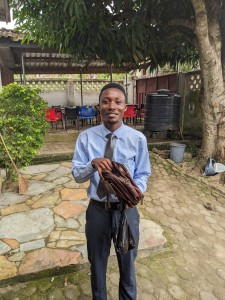
Anansi alumni Eric, Seidu, Daniel and Sarah are already at Anansi House. Eric is a new university graduate, about to take up a teaching position. When he shows me around M’peasem, he tells me the word for the road’s rutted ruggedness is nungunungu.
Anansi’s Managing Director, Daniel Osei, is a force of nature who graduated from Ghana’s first Liberal Arts college, Ashesi University. He works and often sleeps in the Anansi office in what used to be Kathryn’s garage. Among the many hats he wears, Daniel manages applications for Anansi’s secondary school assistance. More than three hundred kids applied for next year’s scholarships, but there’s only money for thirty-nine. To help winnow the pool, Daniel makes home visits to assess applicants’ needs and living situations. That is what he planned to do for a few days–until another force of nature changes his plans.
In an epic rain event, Ghana receives a three-day deluge. Gully-washing torrents destroy roads and turn villages into islands, disrupting transport everywhere. Now I get how nungunungu happens.
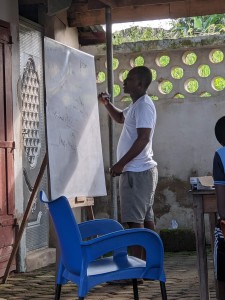
It’s two days until sixteen mostly-math-and-science-track students come for Host and Teach. Host and Teach is Daniel’s brainchild. Nearly every month, he holds intensive retreats for current students. While better-off classmates spend school holidays with families, these kids will have two weeks to hit the books.
You should know when you visit Kathryn that she has a way of seeing how you can be useful, matching skills to visitors so everybody benefits. She told me I could maybe help the students with writing. It wouldn’t take much of my time. Sure, I said. Happy to help.
Friday morning I awake feeling a little otherworldly, disoriented. I’m running even warmer than my usually sweaty state and somehow my skin fits too tightly. A few hours later the clinic confirms that I have malaria.
Returning from the clinic, I join students make their way up the nungunungu road sporting clean Anansi t-shirts, carrying cotton knapsacks or a burlap bag full of yams. At the porch they shed umbrellas and slip off plastic shoes to come inside. Seidu, Anansi alumnus and fresh university graduate, gives them each a COVID test. After a hot meal prepared by alumna Sarah, they can rest. Kathryn’s two spare bedrooms will serve as dormitories: Ten boys in one, six girls in another. All of us need rest.
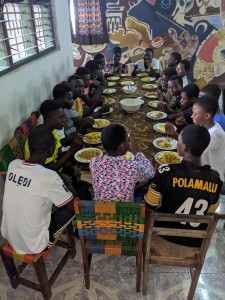
I’m sleeping, fevered and fitfully, when the lights snap on at 5 am. The students have begun their day with equally fevered sweeping and cleaning. I go back to sleep. By the time I have recovered, Host and Teach is in full swing.
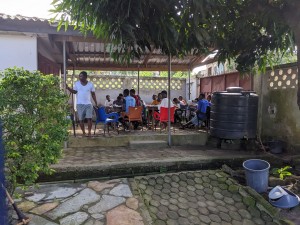
As soon as it’s light enough, students take their places at tables in what used to be Kathryn’s driveway for two hours of math instruction. What follows breakfast is another nine hours of enrichment: Chemistry, Physics, Social Science, more Math. Teaching eight hours of basic subjects isn’t enough for Daniel. He slips in what he considers essential classes: Ethics, Career Development, Public Speaking, Programming.
The kids are all in and happy about it, seriously happy about school. They’re eager, astute, hardworking sponges intent on taking advantage of this opportunity. It feels urgent.
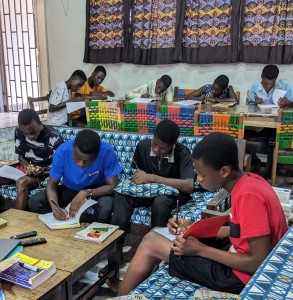
Assignment #1: What is your name and your story?
English has been their language of instruction since they began school. They’ve learned to spell words properly and accept whatever grade is given. No one taught these kids to write.
I tell them writing is a process, pass out composition books and erasable pens. Florence, Benjamin, Naomi, Francis and Francis, Dawuud, Mavis, Winnifred, Kelvin, Lameen, Samuel, Ephraim, Solomon, Prince, Clementina, Festus, and Raphael communicate in a language that is not their mother tongue, using the stiff construction of a textbook with only a nod to grammar and punctuation.
I write them each a letter to show how to critique supportively, but there’s a lot more to say. Their compositions are the basis for each new lesson.
Verbs must agree; people must agree.
They eat it up.
Kathryn says nobody ever asks about their lives, hopes, opinions, dreams. When I ask, sentences pour out like Ghana’s rain event, run-ons that mimic the voice of an excited teen. These sentences could run until they reached the sea, right through the Door of No Return.
Next lesson.
“And, and, and, and . . .” I chant, shaking my head. “. . . dabi, dabi, dabi,”
Just say No to run-on sentences.
“So, so, so, so…” I sing. I wait.
“Dabi, dabi, dabi.” They sing back, laughing, confident, eyes bright. Someone is finally explaining the rules. They’re getting the hang of it. It doesn’t take much.
Together, we tame unfettered heaps of words.
A paragraph, I say, is like a camel train of sentences. An overburdened camel will sink to its knees, unable to continue, and hobble those behind him in the train.
I, too, am speaking a new language.
The next time they hand in their notebooks, concise thoughts are clearly punctuated.
Well-mannered sentences respect what will come after, then end gracefully. No camels have been harmed.
Assignment #2. Write about a journey that you took or hope to take.
Past and future tense, conditional. Conditional means the outcome is uncertain, no matter how much faith you have.
Your dream, your hope, your desire, your wish. It’s not enough to use the future tense, then add God willing.
I could, I would, I might.
If only.
None of them expected to afford the cost of secondary school. They understand that passing means they won’t starve.
Perhaps, perhaps. . . .
Now they dream of careers in engineering, medicine, ophthalmology, entrepreneurship, education, cybersecurity. Common to them all is immense faith. Anansi can give them a taste for miracles, but there’s only enough money for three university scholarships.
What about the rest?
It wouldn’t take much.
Assignment #3. What experience changed who you are inside?
The stories that pour out of them are harrowing. Hazing at secondary school. Sexual abuse. Betrayal. Death of many parents. Despair. Nungunungu childhood.
They share what they have not put into words before. I’m flabbergasted by their trials. Are these the same kids who seem to be always laughing? My heart is breaking for them. They write matter-of-factly about the tiny miracles that brought them to this new world. A stranger’s words. One person’s compassion.
And something keeps them going, still keen to learn.
Two years ago, when they sat their Junior High School exams, secondary school was only a dream. They didn’t lack intelligence or diligence, only money. It didn’t take much. Two hundred and fifty dollars meant the difference between following their dreams and a lifetime in the market selling yams and kenkey.
It doesn’t take much.
Assignment #4. Write a funny story.
Perhaps we ought to lighten up.
At first their tales elicit chuckles, then giggling fits, then they convulse me with laughter. But my work has become serious. They must succeed.
“I and my friends” a story often begins.
Next lesson.
Put Others First, I admonish.
They already know. In the evenings, after fourteen hours of classes, they help each other with assignments.
By now, I’m all in, too. There’s so much I can do before I leave yet so little. I set up final office hours to give them personal encouragement. My broken heart overflows with compassion. I urgently want their success. To teach young people who are ravenous to learn, for whom so little means so much gives me joy, optimism, maybe a belief in miracles. It didn’t take much.
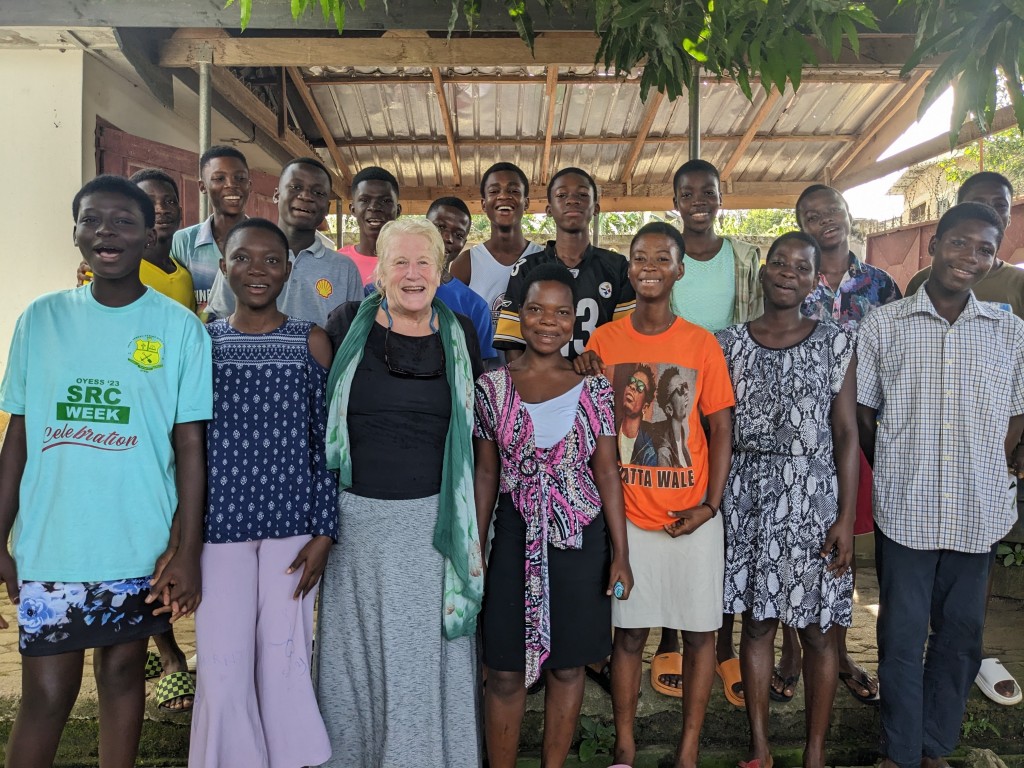
Thank you Florence, Benjamin, Naomi, Francis and Francis, Dawuud, Mavis, Winnifred, Kelvin, Lameen, Samuel, Ephraim, Solomon, Prince, Clementina, Festus, and Raphael for your hospitality. You trusted me with your inner lives and generously shared your authentic selves, hosting and teaching me. It has been an honor.

